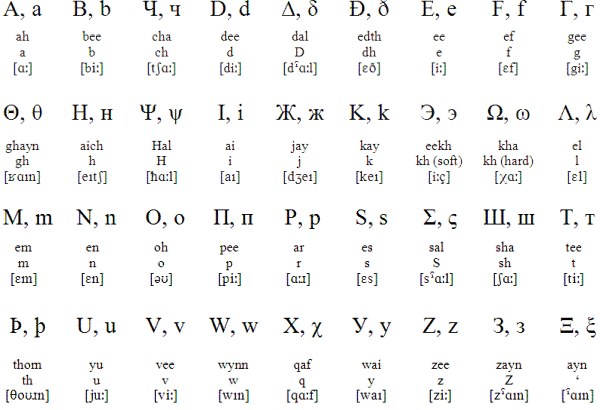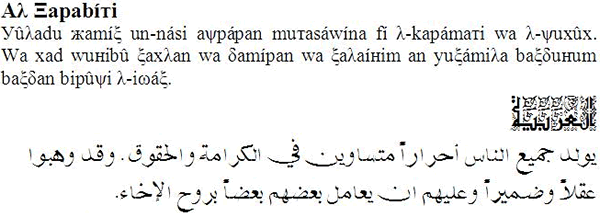The Modern Standard Alphabet was invented by John Allen as an alternative way to write Arabic, Dari and Pashto. It could also be used to write other Semitic and Indo-European languages. It was inspired by the Interbet and is based on the Latin alphabet, with some Cyrillic and Greek letters. The Cyrillic letters are used for variations or where letters might be ambiguous, and the Greek is reserved for Semitic letters that have no real equivalent in either the Latin or Cyrillic alphabets.
This is a (mostly) phonetic alphabet, and is meant to facilitate standardization throughout the world so that people in the Middle East can have a method for using modern technology without the vexing problems that the Arabic script poses for computers. If it became generally adapted a person could go from Kansas to Kazakhstan and be able to at least read the signs.




All human beings are born free and equal in dignity and rights. They
are endowed with reason and conscience and should act towards one another
in a spirit of brotherhood.
(Article 1 of the Universal Declaration of Human Rights)
If you have any questions, you can contact John Allen at: john_w_allen[at]yahoo[dot]com
Constructed scripts for: Ainu | Arabic | Chinese languages | Dutch | English | Hawaiian | Hungarian | Japanese | Korean | Lingala | Malay & Indonesian | Persian | Tagalog / Filipino | Russian | Sanskrit | Spanish | Taino | Turkish | Vietnamese | Welsh | Other natural languages | Colour-based scripts | Tactile scripts | Phonetic/universal scripts | Constructed scripts for constructed languages | Adaptations of existing alphabets | Fictional alphabets | Magical alphabets | A-Z index | How to submit a constructed script
[top]
You can support this site by Buying Me A Coffee, and if you like what you see on this page, you can use the buttons below to share it with people you know.

If you like this site and find it useful, you can support it by making a donation via PayPal or Patreon, or by contributing in other ways. Omniglot is how I make my living.
Note: all links on this site to Amazon.com, Amazon.co.uk
and Amazon.fr
are affiliate links. This means I earn a commission if you click on any of them and buy something. So by clicking on these links you can help to support this site.
[top]